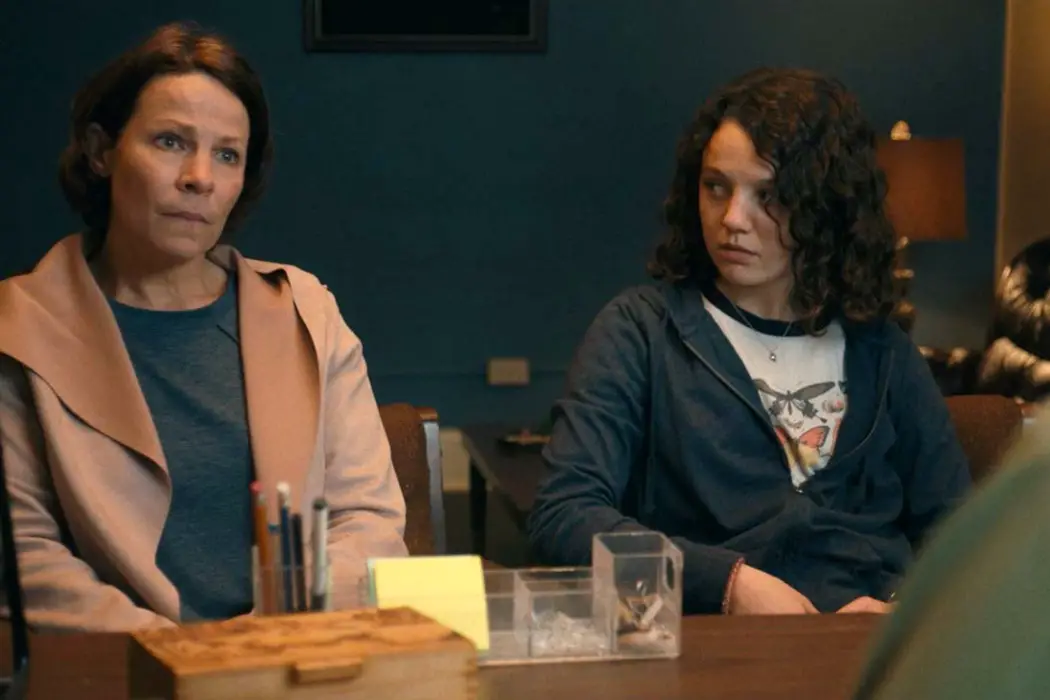PAPER SPIDERS: A Thoughtful Coming-Of-Age Tale About Delusional Disorder

Andrew Stover is a film critic/writer from the Chicagoland. His…
Paper Spiders is another bold attempt to put an end to the shame linked to mental illness. So many filmmakers in the past have attempted to do so by featuring a teenage perspective. From Stephen Chbosky’s The Perks of Being a Wallflower to Thor Freudenthal’s much recent Words on Bathroom Walls, mental illnesses such as PTSD and schizophrenia were handled with empathy and insight on account of bringing a teenage perspective to misunderstood illnesses. Paper Spiders is the latest from director Inon Shampanier, who co-writes the perceptive script with his wife Natalie Shampanier. Taking from personal experience, they explore delusional disorder with accuracy and newfound sensitivity.
Dawn (Lili Taylor) recently lost her husband, and she dreads the day when her 17-year-old daughter, Melanie (Stefania LaVie Owen), moves away for college. The film begins with Melanie and Dawn touring the USC college campus, and Dawn is curious about campus security and the safety of her daughter. Melanie is understandably embarrassed by her mother’s constant fears. Even so, Melanie has no reason to think that her mother’s fears are completely irrational considering that a child moving away is relatable to any parent.
However, something occurs that changes how Melanie, and viewers, ultimately perceive Dawn’s increasingly erratic behavior. Dawn is absolutely convinced that their neighbor is stalking her, so much so that she calls the police and files a restraining order against him. But there is no evidence to support that the neighbor has done any stalking. Melanie eventually realizes that Dawn is suffering from delusional disorder, and she has always suffered from it, but it would appear that it is Melanie’s forthcoming departure that exacerbated the condition.
Lili Taylor & Stefania LaVie Owen Give Magnificent Performances
What begins as a breezy coming-of-age tale about a flourishing teenager and her overprotective mother who is afraid of being left alone when her daughter moves away for college, becomes a sober and deeply affecting drama about living with mental illness. Delusional disorder is a serious, incurable mental illness in which a person experiences delusions and has unshakable beliefs in something untrue. If one ever tries to challenge their reality, one will be confronted with hostility and persistence in that their false reality is true.

Initially, Melanie is unaware that her mother’s paranoia stems from a mental illness. But even before the escalating paranoia about their neighbor, Dawn makes a few comments indicating that her paranoia has always existed. For example, after being driven home by a rideshare driver, Dawn says to Melanie, “Leave a big tip. He knows where we live.” Admittedly, nobody can truly know a person’s intentions or subsequent reactions, but that was one of many moments when Dawn imagines the worst-case scenario.
As Dawn’s delusions intensify, she loses her job as a receptionist at a law office run by attorney Bill Hoffman (David Rasche). It is Bill who advises Melanie that this isn’t the first time Dawn made unsubstantiated claims about somebody. Desperate to help her mom, Melanie visits her high school guidance counselor (Michael Cyril Creighton) for advice, and he is the one who suggests that her mom may have a delusional disorder. As advised by the counselor, Melanie tries to improve her mother’s social life, hoping a romantic relationship will alleviate her condition. Unfortunately, treating the condition is not as easy as Melanie would like to think. Michael Cyril Creighton gives an amusingly peppy performance as the inept yet well-intentioned guidance counselor, but the way the character is portrayed makes me believe he’s in the wrong movie.

Stefania LaVie Owen delivers a remarkably subdued and heartfelt performance as Melanie. It helps that Melanie is written with an agreeable amount of naiveté and boundless compassion, which only makes her relentless pursuit to help her mom all the more emotionally demanding yet admirable. The responsibility that Melanie takes on is too much for a teenager to do by herself. Yet, there are no relatives or friends who can assist Melanie with her mother’s illness, which isn’t a story flaw in itself but there is no explanation, subtle or not, to provide context for why that is.
Lili Taylor gives a gripping performance as Dawn, whose loving, motherly nature can quickly turn volatile. During a paranoid episode, Dawn’s gaze goes in many directions, and her body language becomes progressively taut. Taylor knows how to exude physical and verbal severity with precision. Owen and Taylor are a convincing mother-daughter duo, who are both being weighed down by mental illness and feeling the foundation of their relationship crumble beneath them. That being said, the Shampaniers ensure that hope is not far gone for either of them. Paper Spiders is tonally and structurally accessible for younger and older viewers, which brings me to the melodramatic aspect of an otherwise earnest mental health drama.
An Unnecessary Romance Subplot
In addition to dealing with her mother’s delusional disorder, Melanie is dealing with typical teenager stuff. Melanie is incredibly smart, awarded as salutatorian. There is a time-consuming subplot involving an alcoholic rich boy named Daniel (Ian Nelson), who wants more than anything to take Melanie out for a date. Ian Nelson’s performance as the smooth-talking bad boy is charismatic, but his presence is unneeded. When compared to Melanie’s struggles with her mother’s mental illness, Daniel’s alcoholism is not treated as solemnly — and as a result, his character takes up screen time that would have benefitted Melanie and Dawn’s relationship.
Despite the bleak subject matter, there is humor sprinkled in throughout. For example, Melanie agrees to go on a date with Daniel on the same night Dawn goes on a date with a man Melanie set her up with on a dating application. To subvert expectations, Daniel is the one who takes Melanie to a fancy restaurant, while Dawn’s date takes her to an informal family restaurant. The disparity between the two dates is genuinely comical and unexpected.

Zach Kuperstein’s smooth, dimly lit cinematography emphasizes Dawn’s slow descent into paranoia with chilling zoom-ins, steady close-ups, and neat overhead shots that veer toward horror. At one point, the camera zooms into a frightened Dawn, who eerily whispers to Melanie, “You hear him walking?”
Although an aura of apprehension lingers throughout, the Shampaniers do not poorly represent delusional disorder; they do not generate scares and thrills at the expense of the mental illness. Instead, they make certain that the true terror is the potential collapse of Melanie and Dawn’s relationship, which is corroding due to the delusional disorder. Nevertheless, the Shampaniers make sure to inform Melanie and the audience that Dawn did not do anything specific that resulted in her getting a delusional disorder. No one chooses mental illness. Many external and genetic factors cause mental illness. To lose someone mentally is almost as difficult as losing someone physically.
As Dawn’s disorder worsens, hateful words are spoken and loyalties are broken. However, the conclusion establishes hope, healing, and sacrifice. But more interestingly, the ending brings up a question about the future Melanie decides to lead and whether she made the right decision.
Conclusion: Paper Spiders
Inon and Natalie Shampanier bring attention to delusional disorder, and they do so with sincerity and delicacy. Fortunately, the sensational performances from Lili Taylor and Stefania LaVie Owen prevent the film from succumbing to melodrama. Based on performances alone, Paper Spiders is a memorable coming-of-age tale, and it is a step in the right direction when it comes to destigmatizing mental illness and widening the public’s understanding of delusional disorder.
Have you seen Paper Spiders? If not, are you interested in seeing it now? Let us know in the comments!
Paper Spiders is now available to rent or buy on video-on-demand.
Watch Paper Spiders
Does content like this matter to you?
Become a Member and support film journalism. Unlock access to all of Film Inquiry`s great articles. Join a community of like-minded readers who are passionate about cinema - get access to our private members Network, give back to independent filmmakers, and more.
Andrew Stover is a film critic/writer from the Chicagoland. His film & TV reviews can be found on Film Inquiry & Film Threat.












